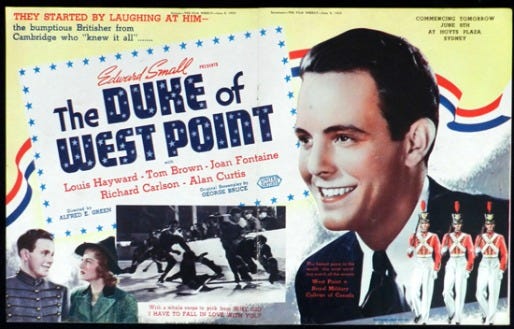The Duke of West Point (1938)

There's a long though not terribly busy cinematic tradition of stories about young men attending military academies. In my lifetime, there has been "An Officer and a Gentleman," "Taps" and "The Lords of Discipline." Nearly all of them tie together the themes of boys coming of age and free spirits struggling under the yoke of military culture. (Perhaps notably, there haven't been any mainstream films since the 1980s that I can recall.)
It turns out they were making "cadet movies" even back in 1938. "The Duke of West Point" is about an American-born but British-raised fellow, Steven Earley, who struggles to fit in with his Yank brothers. Or rather, he spends the first half of the movie as an outsider and scamp with little regard for the traditions of the United States Military Academy. Then he faces his great crisis and spends the last act struggling to reconcile himself with his adopted community.
I thought it a rather good comedy/drama, and enjoyed discovering it as part of my extended, open-ended classic film education. I had never heard of Louis Hayward, who plays Earley, and found him to be a charming twinkly leading man in the Cary Grant tradition. His character always seems a little smoother and more effortless than everyone around him.
Hayward had a lengthy career, first in films in a lot of adventure and swashbuckling roles — including the first screen iteration of Simon Templar, aka "The Saint" — before moving on to television work. He was successful enough in "Duke" to land a three-picture deal and cement his career.
I should point out he was almost 30 years old playing a character who is a freshman, and later a sophomore, in military college. It seems Hollywood has always feared casting actual teenagers as themselves.
The story is fairly straightforward. Earley, the son of an American colonel-turned-diplomat, is a BMOC at Cambridge who returns to the Americas to attend West Point, something every son going back five generations has done. He's a facile fellow, good at most everything he tries, especially sports and the ladies. He smugly assumes his life of easy achievement will continue at West Point.
Quickly dubbed "Duke" for his British accent and suave, superior manner, Earley does seem to take it all in stride in the early going. He quickly draws the ire of his "yearling corporal," Cadet Strong (Alan Curtis), a second-year student who takes it upon himself to school the striplings in the ways of the Point.
Things build, seemingly unavoidably, to a mano-e-mano bout of fisticuffs between the two. In a rare break from Hollywood tropes, the hero actually seems to take the worst of it from the oafish antagonist.
He does get along well with his two roommates, Jack West (Richard Carlson), the straight-arrow son of a poor widow, and Sonny Drew (Tom Brown), a flamboyantly enthusiastic cadet who sometimes gets picked on for his eager-beaver ways. They both later get to play a key role in the education of Earley — as the unwitting recipient of charity and a George Gipp stand-in, respectively.
Joan Fontaine has an early memorable role as Ann Porter, the daughter of "Doc" Porter (Charles D. Brown), the medical trainer for most of the sports team. Doc washed out as a cadet years before, and gets to have a stirring speech about places like this getting into the blood of young men — not unlike Charles S. Dutton role in "Rudy" many decades later.
Ann is ostensibly the girlfriend of Strong, though she seems to regard him more as disposable arm candy than the other way around. Earley makes a full-court press for her attentions, including sneaking out of barracks after hours — a court-martial offense. Much of the fun-and-games tone of the early part of the movie derives from the cat-and-mouse games he plays with Strong and others to flout the rules on her behalf.
The big transition is when Earley sneaks out again and is caught, though this time for non-selfish purposes. Wishing to protect the reputation of others, he lies about his activities that night. As a result, he is allowed to remain at West Point but is "silenced" -- aka, no other cadet will speak to him or even acknowledge his presence (with the exception of his two buddies).
After so much laughter and romance, it's a startling change in tone, and not a transition that director Alfred E. Green and George Bruce manage completely. We keep expecting Earley to have a big laugh at the whole thing, but after a time we begin to realize how much his treatment weighs upon him.
He resolves to earn back their trust by becoming the best cadet that ever was — top of the class academically, the unquestioned star of the football and hockey teams, and so on. It does little avail him of their affections.
A lark that segues into a study of a man's mettle, "The Duke of West Point" is a little-remembered but worthy soldier in the military school genre.
4 Yaps



